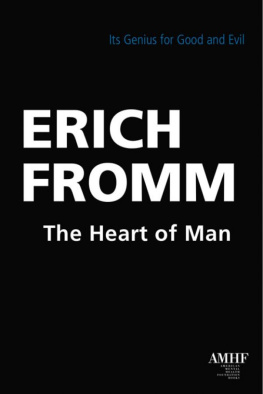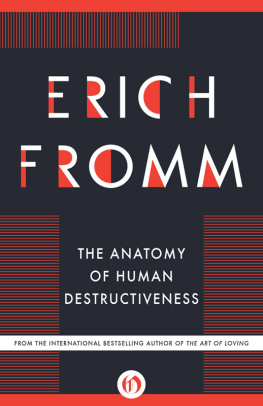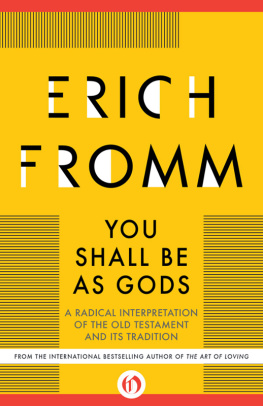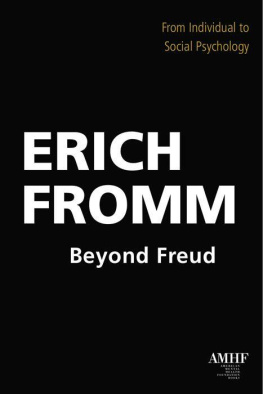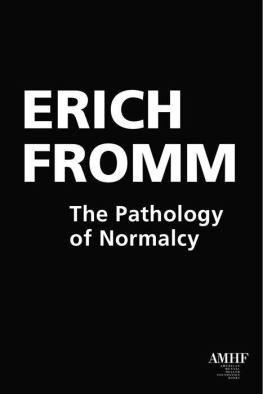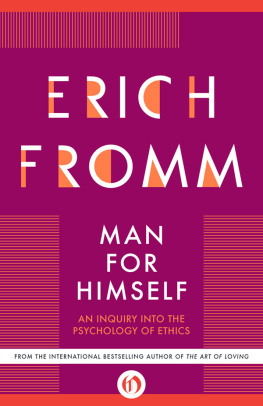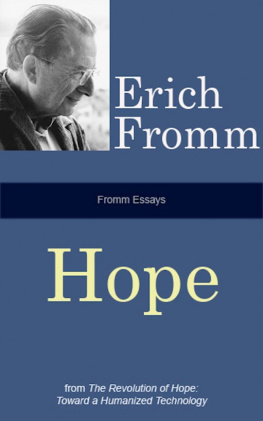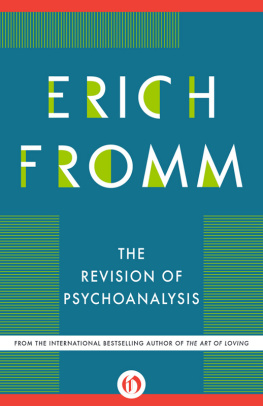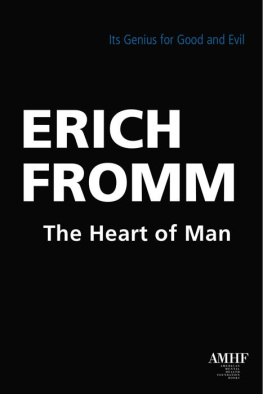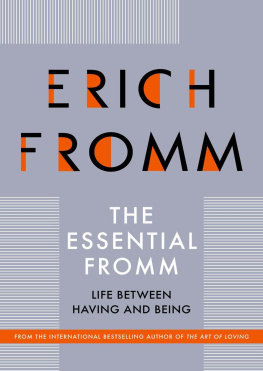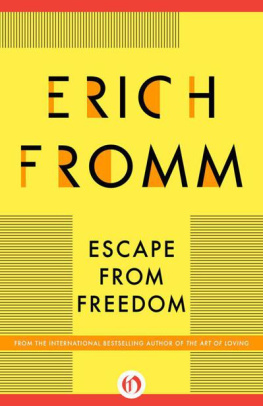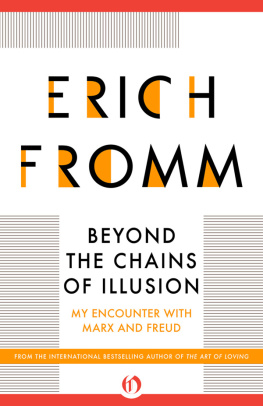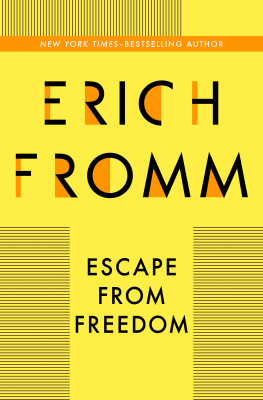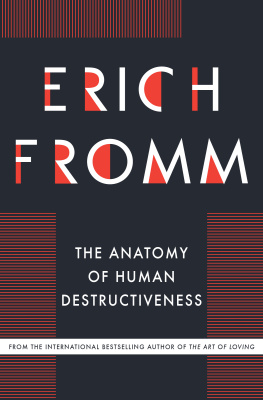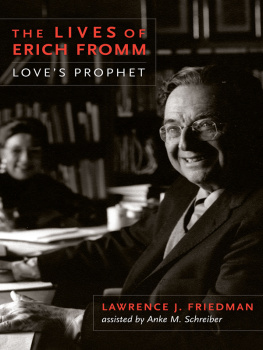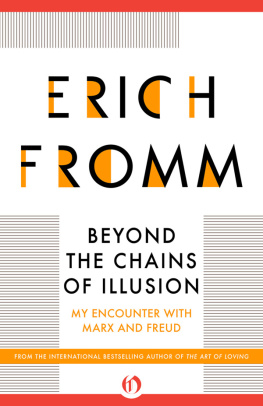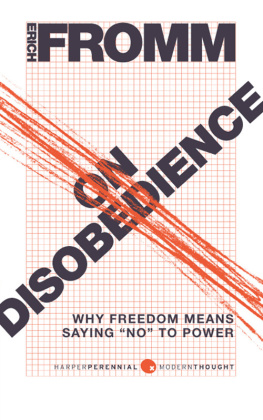Fromm - The Heart of Man : Its Genius for Good and Evil
Here you can read online Fromm - The Heart of Man : Its Genius for Good and Evil full text of the book (entire story) in english for free. Download pdf and epub, get meaning, cover and reviews about this ebook. year: 2011, publisher: Smashwords Edition, genre: Science. Description of the work, (preface) as well as reviews are available. Best literature library LitArk.com created for fans of good reading and offers a wide selection of genres:
Romance novel
Science fiction
Adventure
Detective
Science
History
Home and family
Prose
Art
Politics
Computer
Non-fiction
Religion
Business
Children
Humor
Choose a favorite category and find really read worthwhile books. Enjoy immersion in the world of imagination, feel the emotions of the characters or learn something new for yourself, make an fascinating discovery.
The Heart of Man : Its Genius for Good and Evil: summary, description and annotation
We offer to read an annotation, description, summary or preface (depends on what the author of the book "The Heart of Man : Its Genius for Good and Evil" wrote himself). If you haven't found the necessary information about the book — write in the comments, we will try to find it.
Fromm: author's other books
Who wrote The Heart of Man : Its Genius for Good and Evil? Find out the surname, the name of the author of the book and a list of all author's works by series.
The Heart of Man : Its Genius for Good and Evil — read online for free the complete book (whole text) full work
Below is the text of the book, divided by pages. System saving the place of the last page read, allows you to conveniently read the book "The Heart of Man : Its Genius for Good and Evil" online for free, without having to search again every time where you left off. Put a bookmark, and you can go to the page where you finished reading at any time.
Font size:
Interval:
Bookmark:
Erich Fromm
2010
AMHF logo
American Mental Health Foundation Inc
Post Office Box 3
Riverdale NY 10471-0003
www.americanmentalhealthfoundation.org
All rights reserved. No part of this book maybe reproduced, stored in a retrieval system, or transmitted, in anyform or by any means, electronic, mechanical, photocopying,recording, or otherwise, without the written permission of TheAmerican Mental Health Foundation Inc and American Mental HealthFoundation Books.
Library of CongressCataloging-in-Publication Data
First published in 1964 by Harper & Row,Publishers, New York, as volume XII of the Religious Perspectivesplanned and edited by Ruth Nanda Anshen.
Copyright 1964 by Erich Fromm
Printed in the United States of America
ebook ISBN: 9781590562536
Smashwords Edition, License Notes
This ebook is licensed for your personalenjoyment only. This ebook may not be re-sold or given away toother people. If you would like to share this book with anotherperson, please purchase an additional copy for each recipient. Ifyoure reading this book and did not purchase it, or it was notpurchased for your use only, then please return to Smashwords.comand purchase your own copy. Thank you for respecting the hard workof this author.
As thepresent book is reissued, The American Mental Health Foundationcelebrates its 86th anniversary. Founded in 1924, AMHF is dedicatedto the welfare of people suffering from emotional problems, with aparticular concern for individuals with special needs and theelderly. For many years, AMHF generally devoted its efforts tobettering quality of treatment and developing more effectivemethods, available even to low-income wage earners.
The major therapeutic advances andimproved training methods are described in its existingpublications: the series The Search for the Future. Two of thesebooks are available on its Web site under the titles The Challenge for Group Psychotherapy (volume 1) and The Challenge forPsychoanalysis and Psychotherapy: Solutions for the Future (volume 2). Portions of these books are reprinted on the AMHFWeb site in French and German, as they were publishedinternationally (in addition to Italian editions), for a segment ofthe international community. These books were prepared by Dr.Stefan de Schill under the joint sponsorship of AMHF and TheInternational Institute for Mental Health Research, Zurich andGeneva. Volume 3, written by Dr. de Schill and published byPrometheus Books in 2000, is entitled Crucial ChoicesCrucial Changes: The Resurrection ofPsychotherapy.
In 2009, AMHF Books published The Violent Person by Dr. Raymond B.Flannery Jr. This is a book for professionals as well as anyonewith a concern for, and an interest in, the mechanisms for humanviolence, stress at the breaking point (PTSD), and the workings ofthe brain.
Under the supervision and direction of Dr.William Van Ornum, AMHF Books is an exciting new venture. Withinthe mission and under the auspices of The American Mental HealthFoundation, AMHF Books publishes new research as well as works byclassic authors.
Erich Fromm (19001980) famouslyremains one of the authoritative voices of the 20th century, a timethat witnessed unprecedented changes in our understanding of theinner, as well as political, landscape of the human race. AMHFBooks is proud to be the publisher of this world-renownedindividual, one that has shaped our culture well into a newcentury. On the thirtieth anniversary of Fromms death and hundredand tenth anniversary of his birth, AMHF Books celebrates hisvisionary humanism by reissuing two of his books, The Revolution of Hope and The Heart of Man, and publishingtwo, Beyond Freud and The Pathology of Normalcy, for thefirst time.
None of the board members of The AmericanMental Health Foundation receives remuneration. Nevertheless, thecosts of promoting research, preparing translations, anddisseminating its findings and knowledge are high. For this reason,all sales of its books, donations, and legacy bequests constitute ameaningful contribution to the public good. We thank you forhelping us improve the lives of our citizens.
www.americanmentalhealthfoundation.org
This booktakes up thoughts that were presented in some of my earlier books,and attempts to develop them further. In Escape from Freedom I deal with the problem offreedom and with sadism, masochism, and destructiveness; in themeantime clinical experience and theoretical speculation have ledme to what I think is a deeper understanding of freedom as well asof various kinds of aggression and destructiveness. I have beenable to distinguish between various kinds of aggression, whichdirectly or indirectly are in the service of life, and thatmalignant form of destructiveness, necrophilia, which is a truelove of death as opposed to biophilia which is the love of life.In Man for Himself Idiscussed the problem of ethical norms based on our knowledge ofthe nature of man, and not on revelation and manmade laws andconventions. In this book I pursue the problem further and discussthe nature of evil and of the choice between good and evil.Finally, this book is in some respects a counterpart to The Art of Loving. While the maintopic there was mans capacity to love, the main topic here is hiscapacity to destroy, his narcissism and his incestuous fixation.Yet while the discussion of non-love fills most pages, the problemof love is also taken up in a new and broader sense, namely, loveof life. I try to show that love of life, independence, and theovercoming of narcissism form a syndrome of growth as against thesyndrome of decay formed by love of death, incestuous symbiosis,and malignant narcissism.
I have been led to the pursuit of the studyof this syndrome of decay not only on the basis of clinicalexperience but also by the social and political development of thepast years. Ever more pressing becomes the question why, in spiteof good will and knowledge of the facts about the consequences ofnuclear war, the attempts to avoid it are feeble in comparison withthe magnitude of the danger and the likelihood of war, given thecontinuation of the nuclear-arms race and the continuation of thecold war. This concern has led me to study the phenomenon ofindifference to life in an ever increasingly mechanizedindustrialism, in which man is transformed into a thing, and as aresult, is filled with anxiety and with indifference to, if notwith hate against, life. But aside from that, the present-day moodof violence, which is manifested in juvenile delinquency as well asin the assassination of President John F. Kennedy, demandsexplanation and understanding as a first possible step towardchange. The question arises whether we are headed for a newbarbarismeven without the occurrence of nuclear waror whether arenaissance of our humanist tradition is possible.
Aside from the problems mentioned thusfar it is the aim of this book to clarify the relation of mypsychoanalytic concepts to Freuds theories. I have never beensatisfied with being classified as belonging to a new school ofpsychoanalysis whether it is called the cultural school orNeo-Freudianism. I believe that many of these new schools, whiledeveloping valuable insights, have also lost much of the mostimportant discoveries of Freud. I am certainly not an orthodoxFreudian. In fact, any theory which does not change within sixtyyears is, by this very fact, no longer the same as the originaltheory of the master; it is a fossilized repetition, and by being arepetition it is actually a deformation. Freuds basic discoverieswere conceived in a certain philosophical frame of reference, thatof the mechanistic materialism current among most naturalscientists at the beginning of this century. I believe that thefurther development of Freuds thought requires a differentphilosophical frame of reference, that of dialectic humanism . I try to show in this bookthat Freuds greatest discoveries, that of the Oedipus complex,narcissism, and the death instinct, were hobbled by hisphilosophical premises and that, freed from them and translatedinto a new frame of reference, Freuds findings become ever morepotent and meaningful. [1] I believe that it is the frame ofreference of humanism, of its paradoxical blend of relentlesscriticism, uncompromising realism, and rational faith which willpermit the fruitful development of the work for which Freud laidthe foundations.
Font size:
Interval:
Bookmark:
Similar books «The Heart of Man : Its Genius for Good and Evil»
Look at similar books to The Heart of Man : Its Genius for Good and Evil. We have selected literature similar in name and meaning in the hope of providing readers with more options to find new, interesting, not yet read works.
Discussion, reviews of the book The Heart of Man : Its Genius for Good and Evil and just readers' own opinions. Leave your comments, write what you think about the work, its meaning or the main characters. Specify what exactly you liked and what you didn't like, and why you think so.

